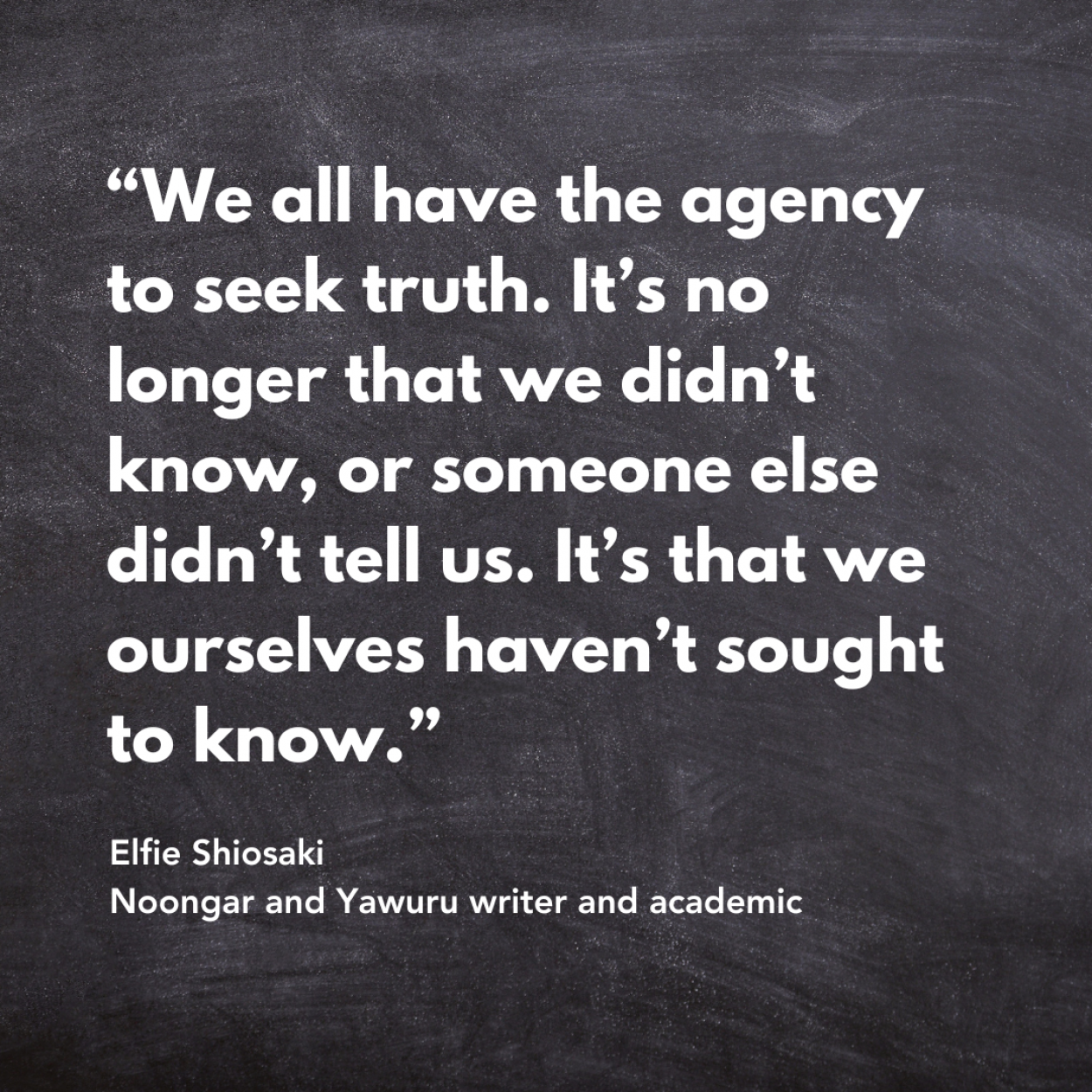
Engaging in truth-telling this NAIDOC Week and beyond
With the Greens newest proposed legislation making the rounds in the news, you might have heard the word ‘makarrata’ a lot lately. A Yolgnu word for peacebuilding, makarrata is what the Uluru Statement from the Heart describes as “the culmination of our agenda: the coming together after a struggle.”
A key aspect of makarrata is truth-telling – the open sharing of historical truths to allow societies to move forward. When done properly, it is a process that allows communities to bring to light the true history of colonial conflict in this country, while acknowledging the strength, survival, courage and resilience of Aboriginal and Torres Strait Islander peoples through it all.
But if there’s one thing the results of last year’s referendum on the Voice has shown us, it’s that real truth-telling is still missing and much-needed in this country.
As Noongar and Yawuru writer Elfie Shiosaki puts it, “to practice makarrata is to seek a full understanding of a conflict and, after this understanding has been reached, seek a settlement for both conflicting parties and next generations.”
From minimising the ongoing impacts of colonisation to outright lies about First Nations culture and peoples, the tone of last year’s debate about the Voice has sadly shown us that, by and large, non-Indigenous Australians still do not fully understand the truth of this nation – whether it be in regards to the long history of this land before invasion, the brutal colonisation that founded today’s nation or the continuing impact of that legacy.
“Whether we acknowledge it or not, we co-exist in a post-conflict nation which has not yet made peace with Aboriginal and Torres Strait Islander people. We have not yet sought a full understanding of our conflict. Instead, we find ourselves in a seemingly unending storytelling war with each other.” – Elfie Shiosaki
Recent research by Professor Heidi Norman and Dr Anne Maree Payne found that, while truth-telling of this sort was an everyday activity for First Nations people, non-Indigenous Australians continue to be unsure of what their role in truth-telling might be. This builds on findings from the 2022 Australian Reconciliation Barometer which found that only 6% of non-Indigenous respondents had participated in a local truth-telling activity within the year compared to 43% of First Nations respondents.
Non-Indigenous Australians’ failure to engage in meaningful truth-telling to acknowledge our shared past leaves us with little hope of moving forward together as a country or addressing the structural marginalisation of First Nations peoples.
Educational reforms to include Indigenous education, formal truth-telling bodies like the one proposed by the Uluru Statement from the Heart or Victoria’s Yoorrook Justice Commission and publications like the ‘Bringing Them Home’ report offer an essential way forward.
But we also need to talk about personal responsibility.
Whether it be through books, documentaries, news publications, podcasts, or the more formal processes outlined above, all of us now have access to varied and numerous ways to engage with this history. As Shiosaki writes, “We all have the agency to seek truth. It’s no longer that we didn’t know, or someone else didn’t tell us. It’s that we ourselves haven’t sought to know.”
So this NAIDOC Week, our call to our non-Indigenous followers is this – ask yourself, when was the last time you engaged in truth-telling? And how could you make this practice a bigger part of your everyday life, not just this week but beyond?
Below is a list of resources we’ve put together to help you get started, built around the three types of truth-telling identified by Professor Norman and Dr Payne’s research.
Truth-telling to achieve justice for First Nations people
- Read No More: Racial and Gendered Violence, by Maggie Blanden for Common Ground
- Read Yoorrook Justice Commission: Jarvis’ Story, by Maggie Walter for IndigenousX
- Read Wealth Redistribution in ‘Australia’, by Phoebe McIlwraith for Common Ground
Truth-telling to promote reconciliation and healing
- Read Alice Springs Truth-Telling Circle hosting frank, open talk between Aboriginal and non-Aboriginal locals, by Elsa Silberstein for ABC News
- Watch Camp Sovereignty
Truth-telling to challenge and change historical understanding
- Watch The Australian Wars by Rachel Perkins
- Watch First Australians by Beck Cole and Rachel Perkins
- Read The Killing Times by the Guardian
- Read Dhoombak Goobgoowana: A History of Indigenous Australia and the University of Melbourne
- Watch We Don’t Need a Map by Warwick Thornton
- Read and watch First Nations storytelling by the Australian Museum
- Read First Knowledges Collection edited by Margo Neale